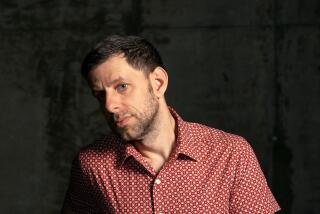DANCE REVIEW : ‘RUHR-ORT’ a Stark and Powerful Work
- Share via
The structuralist, task-oriented modern dance that evolved in the 1970s meets the hyperathletic, object-obsessed movement metaphor of the ‘90s in “RUHR-ORT” (“A Place Called the Ruhr”), an ambitious, 70-minute male septet by German choreographer Susanne Linke.
Presented Sunday in the brand-new Richard and Karen Carpenter Performing Arts Center at Cal State Long Beach--and perfect for the stadium-style anonymity of that 1,162-seat venue--”RUHR-ORT” aims to fuse impressions of the German industrial heartland with a feminist appraisal of the workers from that region.
It begins with the ominous mechanical clatter and rumble of Ludger Brummer’s soundscore, followed by the dimmest, smokiest glimpses imaginable of a bleak workplace designed by Frank Leimbach. Soon, Linke’s men are climbing ladders, pounding a metal platform with sledgehammers and moving heavy steel ingots to the rhythm of quasi-military cadences, with time off for fishing, fistfights and a communal shower.
In one segment, her dancers may portray workers operating a machine; in the next, they’ll become the machine itself or competitors from the sports world, or prison inmates or army recruits in training. Running-in-place becomes a central image, with the runner sometimes collapsed forward, holding himself off the floor on clenched fists.
Wilfred Kreisiment’s stark overhead and side lighting enhances the sense of weight and the desperate camaraderie of what Linke portrays as a dual “Gotterdammerung”: both an industrial apocalypse and the last gasp of brute masculinity.
Without seeing her companion “Frauenballett” (“Woman’s Ballet”) of 1981, it’s impossible to judge fairly her political stance, although she seems to give men points for sheer endurance and certainly includes enough vignettes depicting exhaustion and fearful isolation to absolve these men of any complicity in creating the living hell on view.
It’s also probably unfair to complain that “RUHR-ORT” recapitulates the achievements of a whole modernist sub-genre--with glints of the stagecraft and thematic preoccupations of everything from Twyla Tharp’s “Fait Accompli” to Lin Hixson’s Goat Island repertory.
At times, Linke and her collaborators give us not a personal vision of the Ruhr so much as the house style of the Frankfurt Ballet under William Forsythe. Elsewhere, the workers she wants to evoke vanish and what we see is merely a grandiose Teutonic gloss on the great American postmodernists.
Troublesome as this sense of deja vu may be, it in no way diminishes the remarkable power and dedication of the cast: Reinhold Behling, Urs Dietrich, Ari Fastman, Karsten Itterbeck, Avi Kaiser, Henry Montes and Thomas Stich.
More to Read
The biggest entertainment stories
Get our big stories about Hollywood, film, television, music, arts, culture and more right in your inbox as soon as they publish.
You may occasionally receive promotional content from the Los Angeles Times.










